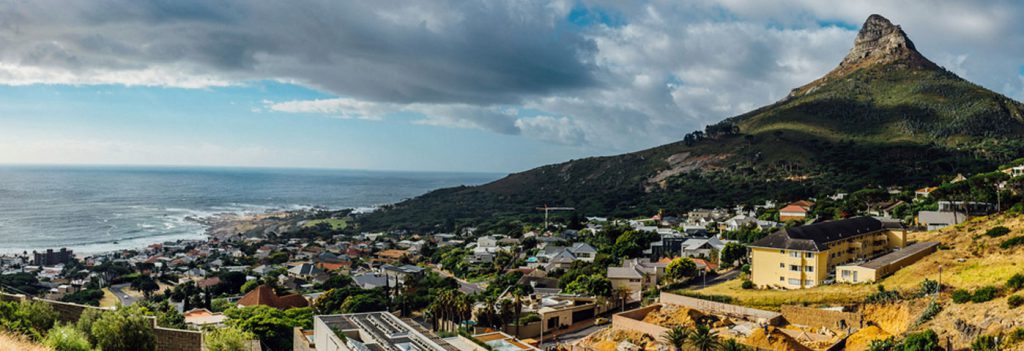Whether you’re arriving or departing, you’ll experience a sense of place at Cape Town International Airport. The airport’s international arrivals terminal was recently renovated to include recreations of key city attractions, which take passengers on an “ambiance journey” of the Cape. Unique features include a reconstruction of Nelson Mandela’s cell on Robben Island, a 58m mural of his life story told through pictures, a row of brightly coloured houses depicting the BoKaap, a wine cellar, as well as giant rocks and pictures of penguins frolicking on Boulders Beach.
Another interesting feature at Cape Town International is the Flybrary, a library with a difference opened in the international arrivals terminal last July. Containing a consignment of mostly second-hand books, the Flybrary is open to passengers and members of the public. The Flybrary is South Africa’s only open airport library where travellers are urged to swap their finished book for another. Furnished with dark wooden shelves and a fireplace to replicate a traditional library, the Flybrary has an interesting collection of books on the shelves like the Da Vinci Code and a couple of economics text books, including many old encyclopaedias. Relying on common courtesy and honesty, readers at the Flybrary are asked to drop one book off before picking up a new one.
Cape Town International Airport is Africa’s most award winning airport, consistently performing the best in its service standards category. The airport is the second busiest airport in South Africa, processing over 25 000 passengers a day, and the third biggest in Africa. There are 28 airlines operating at Cape Town International, flying to and from nearly 100 destinations.
The airport underwent a mega upgrade ahead of the 2010 FIFA World Cup with the development of a Central Terminal Building at a cost of R1.5 billion. The terminal linked the formerly separate domestic and international terminals and provided a common check-in area. Both domestic and international flights check-in takes place in the central terminal building, which contains 120 check-in desks and 20 self-service kiosks. Work on the new road network was also completed in 2010, which included the development of a transport plaza from which passengers are now able to catch a MyCiti bus or taxi a few metres from the main entrance. Two new subways were also built to help pedestrians avoid motorists on the airport’s new arrivals level.
The MyCiTi bus rapid transit system connects the airport to the city centre, stopping at the Civic Centre bus station in Hertzog Boulevard. For route maps, schedules and fare details, visit www.myciti.org.za .
The airport offers convenient, international-standard banking, forex and car rental services. Most retail shops, including bookshops, clothing and souvenir shops, are on the lower level of the central terminal.
Future development at Cape Town International include the realignment of the runway. The multi-million rand project’s environmental impact assessment is currently underway. Realigning the runway will create more space to accommodate larger aircraft and improve the speed at which aircraft leave the airstrip. Expected to be completed in the next three years, the expansion project forms a part of the Airport Company South Africa’s (Acsa) strategy to improve the country’s airports. In September, Cape Town International Airport general manager Deon Cloete said: “We are now looking at concluding the process in June next year and we are expecting positive results. We are hoping that at the end of next year we will begin with construction.”
Fast Facts about Cape Town International Airport
• 8.5 million passengers pass through annually
• 60% business travellers
• 40% leisure travellers
• 25 000 passengers processed a day
• 18 000 bags sorted and processed a day
• 38-minutes: average processing time
• 110 000m2 terminal space
• 28 airlines
• 74 retailers
• 10 000 permit holders
• Over 100 varying brands
• 15 000 daily meeters and greeters
• 8 000 parking bays
• 280 ATMs
• 1.2 million litres of fuel pumped
• R3.9 billion asset base
• 3 000 trolleys
• 15 porters
• 10 government agencies
• 3 handling agents
For more information about Cape Town International Airport, visit www.acsa.co.za/airports/cape-town-international/the-airport.
